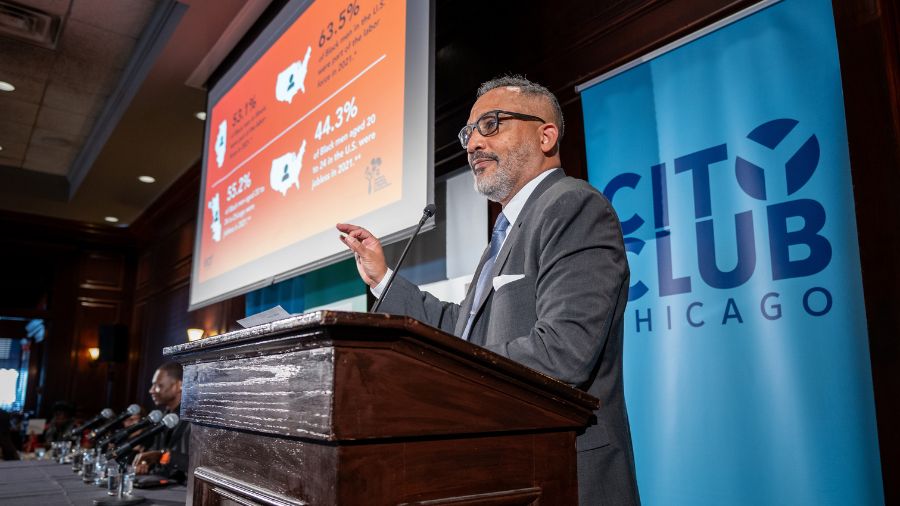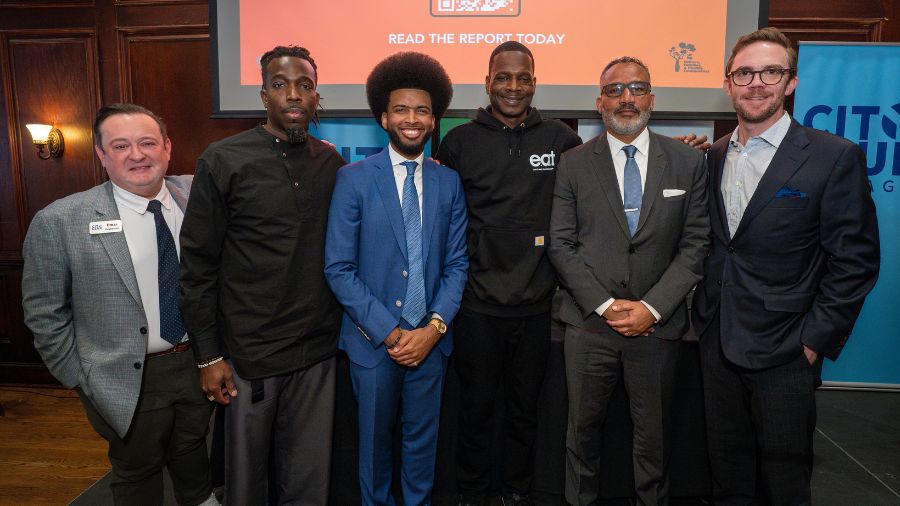From L–R: Deon Hodrick, community advocate and entrepreneur; Richard Wallace, founder of Equity and Transformation (EAT); Clinton Boyd, Jr., executive director of Fathers, Families & Healthy Communities; and Daniel Ash, president of the Field Foundation, speak during the “Breaking the Chains” panel on reclaiming wealth, power, and dignity for Black men in Chicago (Photo Courtesy of The Field Foundation).
As a Black woman, I’ve seen firsthand how financial struggles can profoundly affect a Black man’s self-esteem, mental health and ability to lead his family. It’s heartbreaking to watch—and sometimes, that pressure can lead to choices with serious consequences.
Real change begins when Black men feel seen, supported and empowered to take that first step. They can rise, thrive, and lead stronger families and communities with faith, determination, and the right resources.
That’s precisely the message behind “Breaking the Chains: Reclaiming Wealth, Power, and Dignity for Black Men,” held Tuesday courtesy of The Field Foundation in partnership with the City Club of Chicago and two nonprofits, Equity And Transformation (EAT) and Fathers, Families and Healthy Communities (FFHC).
They were greeted by a whole room of attendees eager for the discussion, which centered around the imperative of investing in Black men and fathers in Chicago.
Breaking the Chains: A Powerful Collaboration for Systemic Impact
The conversation covered the systemic barriers Black men face, including incarceration, mental health and the complexities of fatherhood, noting how organizations can actively create space, provide resources and invite Black men to step into healing, growth and leadership.
Dan Gibbons, CEO of City Club Chicago, began the program, followed by remarks from Caleb Brookman, who highlighted the event’s significance, leading into the introduction of moderator Daniel O. Ash, president of The Fiel Foundation.
The panel featured Clinton Boyd Jr., executive director of FFHC, who shared insights on supporting Black fathers; Richard Wallace, founder of EAT, discussed economic justice for Black informal workers; and Deon Hodrick, a community advocate from Austin, offered valuable lived experience and perspective.
‘We’re Going to Talk About It’: Daniel Ash on Healing and Presence

Daniel Ash, president of the Field Foundation, moderates the “Breaking the Chains” panel, guiding a powerful conversation on reclaiming wealth, power, and dignity for Black men in Chicago. Ash led panelists through personal stories and systemic solutions, emphasizing the importance of presence, healing, and community-driven change (Photo Courtesy of The Field Foundation).
“I was asked recently if we’re going to talk about what’s going on in our country, and while I’ve been deeply worried, my answer was simple: absolutely, we’re going to talk about it,” said Ash.
Ash highlighted the importance of having honest and passionate conversations about these issues to spark individual and collective action.
The moment wasn’t just reflective; it was genuinely intimate.
He reflected on his early work in the social impact space, recalling a time before the gray hair when he was involved in the “Strengthening Fragile Families initiative,” a Ford Foundation-funded project led by Black men in Chicago. The initiative aimed to test a simple thesis: could creating conditions that encourage fathers’ presence in their children’s lives improve outcomes for those children?
Ash said, “For some, the answer feels obvious. Of course, a child is better off connected to their father. But we needed to test it. And we weren’t surprised by what we found. Presence matters. Especially the presence of a Black father.”
He shared his own story. “My father chose to raise a foster child—me. He chose to adopt me. And because of his love, guidance and commitment, I’m here today. This work isn’t just professional—it’s personal.”
In 1998, he authored “Face to Face with Fathers,” which he noted with some disbelief, echoes the findings of a new report that was also released bearing the exact name of the discussion: “Breaking the Chains: Reclaiming Wealth, Power, and Dignity for Black Men.”
“I found my old copy, and nearly everything we wrote then, we’re writing again now. That’s not acceptable. I don’t want my successor on this stage 20 years from now having the same conversation.”
Highlighting the Field Foundation’s mission, Ash also shared the importance of building power on Chicago’s South and West Sides. “We believe the transformation we need will come from residents—Black and Brown folks—tapping into their individual and collective power, and Black men must be a part of that.”
Ash invited panelists to share their journeys into the work, encouraging them to move beyond professional titles and speak to the lived experiences and motivations that led them to the table.
‘This Is Ministry’: Three Men Share Their Journeys Into Leadership
Wallace shared how his roots in service shaped his journey. Raised by a mother who ministered in prisons, he witnessed advocacy firsthand. His path led from labor organizing, where he saw workers lining up before dawn, to launching EAT in 2018 to amplify the voices of those shut out of the economy and democracy.
“I was curious: what happens when our people are denied jobs? We hustle. We survive. We innovate,” he said. “So we started EAT to bring the voices of the excluded—people like Eric Garner and Alton Sterling, who were killed just for trying to survive—into our democracy.”
Hodrick, a participant in EAT’s guaranteed Income initiative, credited the program for financial support and opening doors to new relationships, spaces and conversations. Hodrick said that because of his involvement, he experienced personal growth and began to see himself as a leader. Inspired by Wallace’s example, Hodrick found purpose in serving his community and making more encouraging choices.
“Through the program, I received $500 a month for a year. But it wasn’t just the money. It was the people I met, the rooms I got to sit in, the conversations I never thought I’d be part of.”
Boyd, Jr. brought his story full circle—from a young man on the West Side of Chicago to a leader of one of its most vital family organizations.
“I’m a child of the Great Migration—my mother came from Arkansas, my father from the Mississippi Delta. And I’ve always seen this work as ministry,” he said.
Boyd became a father at 15—a turning point that shaped his life and purpose.
“As a young Black father, I often found that the systems meant to support families treated me like a liability instead of an asset,” he said. “That fueled my passion to change things—not just for me, but for every Black man I saw going through the same thing.”
His journey took him from Chicago’s West Side to Atlanta and back, earning a bachelor’s from Concordia University Chicago, a master’s from DePaul University and a Ph.D. from Georgia State University, followed by postdoctoral training at Duke. Along the way, he endured profound personal loss—eight friends in ten months, six to gun violence, and two to car accidents.
“It made me reflect on the fragility of life,” he said. “And it made me come home.”
Recalling a recent gathering where he spoke, Boyd, Jr. addressed the stark realities uncovered through new research on economic instability and fatherhood.
“What we found reaffirmed what Black men have been saying for decades—economic hardship doesn’t just affect wallets, it affects self-worth, mental health, and entire family structures.”
A Space to Grow: How Guaranteed Income Changed One Man’s Life
Hodrick closed the discussion with a personal reflection: “They count guys like me out, but we’re smart, we love our families, and we want to do better. The monthly support did more than help financially; it gave me peace of mind. Knowing I could buy my daughter a pair of shoes…shifted my mindset. It gave me the space to grow.”

From L–R: Omar Daghestani, Managing Director and Manager of the City Club of Chicago; Richard Wallace, founder of Equity and Transformation (EAT); Clinton Boyd, Jr., executive director of Fathers, Families & Healthy Communities; Deon Hodrick, community advocate and EAT program participant; Daniel Ash, president of the Field Foundation; and Dan Gibbons, CEO of the City Club of Chicago, gather following a powerful discussion at the “Breaking the Chains” event focused on uplifting Black men in Chicago through equity, economic justice, and community healing (Photo Courtesy of The Field Foundation).
For more information about the organizations and the resources they offer, please visit the City Club of Chicago, EAT Chicago, the Field Foundation, and Fathers, Families & Healthy Communities at their respective websites: cityclub-chicago.org, eatchicago.org, fieldfoundation.org, and ffhc.org.
You can access the report Breaking the Chains: Reclaiming Wealth, Power, and Dignity for Black Men by visiting eatchicago.org/reports/breakingthechains.pdf.
